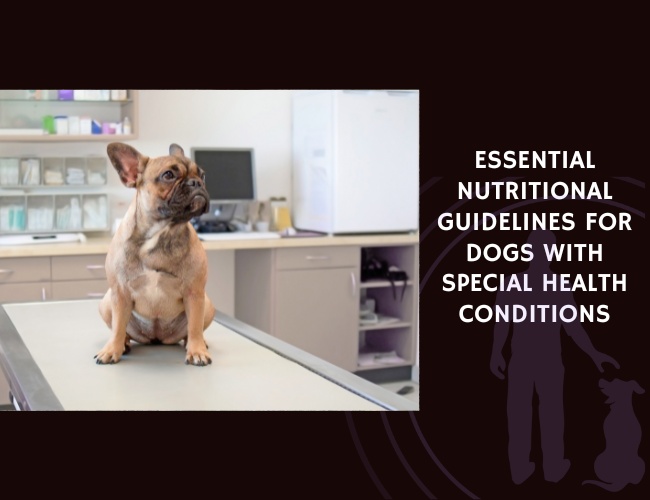Understanding Basic Canine Nutrition
Proper nutrition is essential for maintaining the overall health and well-being of your canine companion. By understanding the role of macronutrients and micronutrients, you can ensure that your dog gets the nutrients they need to thrive, especially when dealing with special health conditions.
Role of Macronutrients in Dog Health
Macronutrients are the building blocks of your dog’s diet and include proteins, fats, and carbohydrates. Each macronutrient plays a significant role in your dog’s health:
- Proteins: Proteins are crucial for building and repairing tissues, making enzymes and hormones, and supporting the immune system. They are made up of amino acids, which are essential for various bodily functions. Dogs need high-quality protein sources from meat, fish, eggs, and certain plants to maintain muscle mass and overall health.
- Fats: Fats provide a concentrated source of energy and are important for cell structure and function. They also help in the absorption of fat-soluble vitamins (A, D, E, and K). Essential fatty acids, such as omega-3 and omega-6, play a role in skin and coat health, brain function, and inflammation control. Good sources of fats include fish oil, flaxseed oil, and animal fats.
- Carbohydrates: While not as critical as proteins and fats, carbohydrates are a good source of energy and fiber. They help maintain digestive health by promoting regular bowel movements. Complex carbohydrates like sweet potatoes, brown rice, and oats are preferable because they provide sustained energy and have a lower impact on blood sugar levels.
Importance of Micronutrients
Micronutrients, including vitamins and minerals, are required in smaller amounts but are equally vital for your dog’s health. They support a multitude of bodily functions:
- Vitamins:
- Vitamin A supports vision, immune function, and skin health.
- Vitamins C and E are antioxidants that protect cells from damage.
- B vitamins are involved in energy metabolism and red blood cell production.
- Minerals:
Dogs may need a balance of these micronutrients through a well-rounded diet or supplements as recommended by a veterinarian.
Foundation for Specialized Dietary Needs
Understanding the basics of canine nutrition is the first step in building a diet tailored to your dog’s specific health conditions. Special dietary needs often arise from various health issues such as obesity, diabetes, kidney disease, food allergies, and age-related conditions. Tailored nutrition can help manage these conditions and improve your dog’s quality of life.
By ensuring a balanced intake of macronutrients and micronutrients, and adjusting their diet based on specific health requirements, we can give our furry friends the best chance at a healthy and happy life.
With a solid grasp of canine nutrition, you’re better prepared to address special health conditions and tailor your dog’s diet to meet their unique needs 👌.
Types of Special Health Conditions in Dogs
Understanding the variety of health conditions that can affect dogs is essential for managing their nutrition effectively. Correctly identifying and addressing the special dietary needs in dogs with health conditions can significantly enhance their wellbeing and prolong their lives.
Overview of Common Conditions
Obesity: Just like humans, dogs can also suffer from obesity. This condition puts them at higher risk for several health issues, including diabetes, cardiovascular diseases, and joint problems. Managing a dog’s weight through portion control, increasing dietary fiber, and monitoring their caloric intake is crucial.
Diabetes: Dogs with diabetes require strict management of their carbohydrate intake to prevent rapid spikes and drops in blood sugar levels. Low-glycemic index carbohydrates and a high-fiber diet can help regulate blood sugar levels effectively, making consistent feeding schedules important.
Kidney Disease: Dogs with kidney disease benefit from diets that are low in protein and phosphorus, reducing the kidneys’ workload while still meeting the dog’s nutritional needs. Omega-3 fatty acids can also play a role in reducing inflammation and supporting kidney function.
Identification of Dietary-Sensitive Conditions
Food Allergies: Identifying and eliminating allergens is key for dogs with food allergies or intolerances. An elimination diet involves removing potential allergens to determine which ingredients are causing the reactions. Hypoallergenic diets that include novel proteins and carbohydrates might be beneficial.
Gastrointestinal Disorders: For dogs with sensitive stomachs, easily digestible diets are a must. Low-fat, high-fiber diets can assist in managing gastrointestinal symptoms. Probiotic supplementation can restore gut flora and improve overall digestive health.
Age-Related Conditions and Joint Issues
Senior Dogs: As dogs age, their metabolism slows down and they may develop various health issues. Older dogs often require fewer calories to maintain a healthy weight. Diets high in fiber aid digestion, while nutrients like glucosamine and chondroitin support joint health. Antioxidants such as vitamins E and C can also help maintain cognitive function in aging dogs.
Joint and Mobility Issues: Dogs with joint problems benefit greatly from diets rich in omega-3 fatty acids, which help reduce inflammation. Maintaining a healthy weight is crucial, as excess weight can exacerbate joint problems. Supplements like glucosamine and chondroitin are also recommended to support joint health.
Properly identifying and addressing these special health conditions through tailored nutritional strategies can make a significant difference in your dog’s quality of life and longevity. By understanding these unique needs, you can better manage their diet to support their overall health and wellbeing.
Dietary Management for Weight-Related Issues
Helping dogs manage their weight is crucial to maintaining their health and quality of life. This chapter will dive into effective strategies for caloric restriction and portion control, the benefits of high-protein, low-fat diets, and safe weight loss approaches.
Caloric Restriction and Portion Control Strategies
Caloric restriction is essential for weight loss. Effectively controlling your dog’s calorie intake begins with determining their daily caloric needs, which can be done with the help of your veterinarian. Portion control is key to ensure you do not overfeed your dog. Measuring the amount of food at each meal rather than free-feeding allows for precise control over caloric intake. Utilize the following strategies for success:
- Measure Food Accurately: Use a measuring cup or kitchen scale.
- Frequent, Smaller Meals: Feeding smaller portions multiple times a day can help control hunger.
- Track Treats: Include any treats or table scraps in the daily caloric intake.
High-Protein, Low-Fat Diet Composition
High-protein, low-fat diets are effective for weight management as they help maintain muscle mass while promoting fat loss. Protein is also more satiating, which means your dog will feel fuller for longer periods, making it easier to stick to the reduced calories. Here’s a breakdown:
- Proteins: Essential for muscle preservation and overall health.
- Fats: Should be lower to reduce caloric density but still sufficient to meet essential fatty acid needs.
- Carbohydrates: Focus on low-glycemic options such as sweet potatoes and brown rice.
Safe and Effective Weight Loss Approaches
When implementing a weight loss plan, it is vital to ensure the process is safe and gradual. Rapid weight loss can lead to muscle loss and other health issues. Aim for a weight loss of 1-2% of the dog’s body weight per week. Here are some effective strategies:
- Regular Exercise: Combine diet with increasing physical activity to enhance weight loss and maintain muscle mass.
- Monitor Progress: Regularly check your dog’s weight and body condition. Adjust food intake as needed.
- Behavior Observation: Watch for signs of stress or lethargy which can indicate that the diet may need adjustment.
Taking a thoughtful approach to managing your dog’s weight involves a careful balance of dietary restrictions, portion control, and nutrient-rich food that supports their overall health. Understanding and implementing these strategies not only aids in weight management but sets the stage for addressing more specific chronic conditions in the next chapter.
Nutritional Approaches for Chronic Conditions
When managing chronic conditions in dogs, nutrition plays a vital role in improving their overall health and managing symptoms. Tailoring their diets can make a significant difference in conditions like diabetes, kidney disease, and gastrointestinal disorders. Let’s delve into these specific dietary approaches.
Managing Diabetes Through Low-Glycemic Carbohydrates
Dogs with diabetes require special dietary care to stabilize their blood sugar levels. A key strategy is incorporating low-glycemic index carbohydrates. These carbohydrates are digested slowly, ensuring a steady release of glucose into the bloodstream, preventing spikes and crashes in blood sugar.
- Low-glycemic food options include certain vegetables and whole grains. Avoiding foods that cause rapid blood sugar increases is essential.
- A high-fiber diet can also help in managing diabetes. Fiber slows down the absorption of sugar, aids digestion, and improves satiety. This combination is crucial for maintaining consistent energy levels and preventing overeating.
- Regular feeding schedules support optimal insulin levels, reducing sudden changes in blood sugar.
Kidney Disease Dietary Modifications
For dogs with kidney disease, dietary modifications are necessary to reduce the kidneys’ workload while ensuring the dog receives the necessary nutrients.
- Low-Protein, Low-Phosphorus Diets: These diets help decrease the burden on the kidneys. Protein metabolism can produce waste that the kidneys must filter out, hence reducing protein intake helps. Similarly, limiting phosphorus is vital since the kidneys struggle to remove excess phosphorus in dogs with kidney disease.
- Omega-3 Fatty Acids: Including these in your dog’s diet can reduce inflammation and support kidney function. Fish oil supplements are a good source of omega-3s.
- Hydration Strategies: Ensuring adequate water intake is crucial for kidney health. Always provide fresh water and consider moist food options to help maintain proper hydration levels.
Dietary Strategies for Gastrointestinal Disorders
Dogs suffering from gastrointestinal (GI) disorders often need easily digestible diets to manage their symptoms effectively.
- Easily Digestible Diets: Low-fat, high-fiber diets are beneficial. Fat is harder to digest and can aggravate GI issues, whereas fiber supports healthy digestion.
- Probiotic Supplementation: Probiotics can restore the natural flora in the gut, improving overall digestive health. These supplements can be a game-changer in managing chronic GI symptoms.
- Frequent, Small Meals: Feeding smaller amounts more frequently can help manage GI problems, reducing the risk of overwhelming the digestive system.
For dogs facing chronic health issues, these dietary changes can make a world of difference. Next, we will explore some supplemental guidelines and how they can support your dog’s health journey.

Special Considerations for Senior Dogs
As our furry friends age, their nutritional needs change. It is essential to adjust their diet to support their aging bodies and keep them healthy. Let’s explore key aspects to consider when feeding senior dogs. We’re here to help you make the best dietary choices for your aging pet!
Adjusting Caloric Intake for Aging Metabolism
Older dogs tend to be less active and have a lower metabolic rate, which means they need fewer calories. Adjusting their caloric intake can help prevent obesity and its associated health problems.
- Reduce Calories: Cut back on portion sizes or choose lower-calorie foods.
- Monitor Activity Levels: Tailor caloric intake to match your dog’s activity level.
- Increase Fiber: High-fiber foods aid digestion and help your dog feel full without excess calories.
Incorporating Joint-Supportive Nutrients
A common issue in senior dogs is joint problems. Providing joint-supportive nutrients can aid in maintaining mobility and comfort.
- Glucosamine and Chondroitin: These supplements help maintain cartilage and joint health.
- Omega-3 Fatty Acids: Found in fish oil, these help reduce inflammation and support overall joint function.
- Antioxidants: Vitamins E and C can help support cognitive function and joint health.
Managing Age-Related Health Issues Through Diet
As dogs age, they may develop various health issues. Adjusting their diet can help manage these conditions effectively.
- Weight Management: Maintaining an optimal weight reduces stress on joints and supports overall health.
- Hydration Strategies: Ensure senior dogs have access to plenty of water, especially if they are on a dry food diet.
- Digestive Health: Senior dogs often benefit from easily digestible diets. Probiotics can support gut health and improve digestion.
Adjusting the diet of senior dogs helps manage their special health needs while promoting their overall well-being. Tailoring their nutrition can significantly enhance their quality of life. As we continue to explore various aspects of canine nutrition, remember that proper dietary management is key to helping our beloved pets thrive at any age.
Supplementation Guidelines
Essential Supplements for Specific Conditions

Supplements can play a crucial role in managing the health of dogs with special needs. Depending on your dog’s specific health condition, certain supplements can be beneficial. Here are some common ones and their uses:
Omega-3 Fatty Acids
Omega-3 fatty acids, commonly found in fish oil, are celebrated for their anti-inflammatory properties. They benefit dogs with joint issues, skin conditions, and kidney disease. These supplements help reduce inflammation, support joint health, and improve skin and coat quality.
Glucosamine and Chondroitin
Often used together, glucosamine and chondroitin are key in supporting joint health. They help to rebuild cartilage and lubricate joints, making them essential for dogs with arthritis or other joint issues.
Probiotics
Probiotics are beneficial bacteria that help maintain a healthy digestive system. Dogs with gastrointestinal disorders can benefit significantly from probiotics, which aid in digestion and help maintain a balanced gut flora.
Risks and Benefits of Supplementation
While supplements can be highly beneficial, it’s essential to use them wisely. Over-supplementation can lead to various health issues. Here are some points to consider:
Benefits
- Enhanced Nutrient Intake: Supplements can fill nutritional gaps, especially for dogs on specialized diets.
- Specific Health Support: Targeted supplements provide extra support for joints, skin, or digestion.
- Prevent Chronic Diseases: Consistent supplementation can help prevent chronic diseases by promoting overall health.
Risks
- Nutrient Imbalances: Excessive intake of certain vitamins and minerals can cause imbalances and toxicity. For example, too much vitamin D can lead to calcium deposits in the body’s tissues.
- Interference with Medications: Some supplements can interfere with medications your dog may be taking. Always consult your vet before adding a new supplement to your dog’s diet.
Proper Dosage and Administration
Administering the right dosage is crucial to prevent adverse effects. Here are steps to ensure safe supplementation:
- Consult Your Veterinarian: Before starting any supplement, consult with your veterinarian. They can recommend the right dosage based on your dog’s specific needs and health conditions.
- Follow the Manufacturer’s Guidelines: Adhere to the dosage recommendations provided by the supplement manufacturer, unless your vet advises differently.
- Monitor Your Dog’s Response: Observe your dog for any changes in behavior, appetite, or health after starting a new supplement.
- Adjust as Needed: Based on your observations and follow-up consultations with your vet, adjust the dosage if necessary.
Implementing these supplementation guidelines can support managing your dog’s special health needs effectively. With tailored supplementation and proper veterinary guidance, you can enhance your dog’s quality of life.
Choosing Between Commercial and Homemade Diets
When it comes to feeding our beloved pets, the decision between commercial specialty diets and homemade meals is crucial. Each option has its merits and considerations, and understanding them helps ensure our dogs’ health and happiness.
Pros and Cons of Commercial Specialty Diets
Commercial specialty diets are tailored to meet specific health needs, making them a convenient choice for many pet owners. Here are some notable pros and cons:
Pros:
- Nutritional Adequacy: Commercial diets are carefully formulated to provide all the necessary nutrients without the need for additional supplementation.
- Convenience: These diets save time and effort, removing the guesswork around meal preparation.
- Consistency: Maintaining a steady diet is easier with commercial options, as each batch is the same.
- Research-Backed: Commercial diets are developed based on research and clinical studies, ensuring they meet health standards.
Cons:
- Cost: High-quality commercial diets can be expensive, which may not fit every budget.
- Preservatives and Additives: Some commercial foods contain preservatives, fillers, and artificial ingredients which can be harmful to some dogs.
- Limited Customization: Although there are many varieties, customization to individual dog’s needs may be limited compared to homemade diets.
Guidelines for Creating Balanced Homemade Meals
Homemade diets allow for customization to specific health requirements, but they require careful planning to ensure nutritional balance:
- Consult a Veterinarian: Before starting a homemade diet, consult a vet or a veterinary nutritionist. They can provide guidelines specific to your dog’s health needs.
- Balance is Key: Ensure the diet includes a proper balance of proteins, fats, carbohydrates, vitamins, and minerals.
- Ingredients Matter: Use high-quality, whole ingredients, and avoid foods that are toxic to dogs, such as chocolate, onions, and grapes.
- Variety is Important: Rotate protein sources and vegetables to provide a wide range of nutrients.
- Supplement Wisely: Only use supplements when advised by your vet to avoid imbalances and toxicity.
By fulfilling these guidelines, your dog’s homemade diet can be both tasty and nutritious.
Importance of Veterinary Consultation
Consulting with a vet or a veterinary nutritionist is an indispensable part of planning any diet, whether commercial or homemade. They can help identify your dog’s specific nutritional needs and monitor their health. Regular check-ups ensure that the diet continues to meet your dog’s requirements as they age or their health conditions change.
Having support from a vet contributes to your peace of mind, knowing that your furry friend is on the right nutritional track. By collaborating with your vet, you can adjust feeding strategies accordingly and make informed decisions about their diet.
Monitoring and Adjusting Special Diets
Ensuring the optimal health of your dog often involves monitoring and adjusting their special diets. This process breaks down into three main components: identifying signs of dietary success or needed adjustments, adhering to regular health assessments, and implementing long-term management strategies. 🐶
Signs of Dietary Success or Needed Adjustments
When monitoring your dog’s diet, look for these signs to determine success:
- Weight Management: If your dog is on a diet for weight loss, steady progress is a positive indicator. Aim for 1-2% body weight loss per week.
- Energy Levels: Healthy energy levels without signs of lethargy or hyperactivity suggest the diet is meeting their energy needs appropriately.
- Digestive Health: Regular bowel movements and the absence of diarrhea or constipation point to well-balanced nutrition.
- Coat Condition: A shiny, smooth coat indicates good overall health, while dryness or excessive shedding may suggest dietary issues.
- Behavioral Changes: Positive behavior, such as reduced aggression and anxiety, often reflects well-managed dietary needs.
On the flip side, signs that adjustment is needed may include unexplained weight changes, digestive issues, or changes in behavior or coat quality. It’s essential to consult your vet if you notice any of these symptoms to adjust the diet plan accordingly.
Regular Health Assessment Guidelines
Routine assessments ensure we catch early signs of health issues and maintain dietary efficacy. Here’s what to look for:
Weekly Check-ups
- Weight Monitoring: Regularly track your dog’s weight to notice trends and make necessary adjustments.
- Behavioral Notes: Pay attention to any changes in behavior, appetite, and energy levels.
Monthly Check-ups
- Physical Examination: Conduct a thorough physical exam, checking for coat condition, signs of joint pain, and overall demeanor.
- Review Dietary Components: Discuss with your vet to ensure the dietary plan is still appropriate. This is especially crucial if there are any changes in your dog’s health status.
Annual Veterinary Visits
- Comprehensive Health Assessment: Have your vet conduct a detailed physical exam, blood work, and other tests as needed.
- Dietary Evaluation: Reevaluate the diet plan to ensure it aligns with any changes in your dog’s health or lifestyle.
Long-term Management Strategies
Effective long-term management of your dog’s diet involves continuous monitoring, keeping up with health assessments, and making adjustments as needed:
- Consistent Routine: Maintain a stable feeding schedule and diet to support your dog’s digestive system and overall health.
- Adaptation to Life Stages: Adjust the diet as your dog ages. For instance, senior dogs may need fewer calories and more joint-supportive nutrients.
- Ongoing Education: Stay informed about canine nutrition and any emerging research that may benefit your dog’s health.
Regular collaboration with your vet is essential to navigate the evolving dietary needs of your dog, ensuring you provide the best care possible.
By paying close attention to these key areas, we can efficiently monitor and adjust our furry friend’s diet, supporting their health and happiness every step of the way. 🐕🦺










